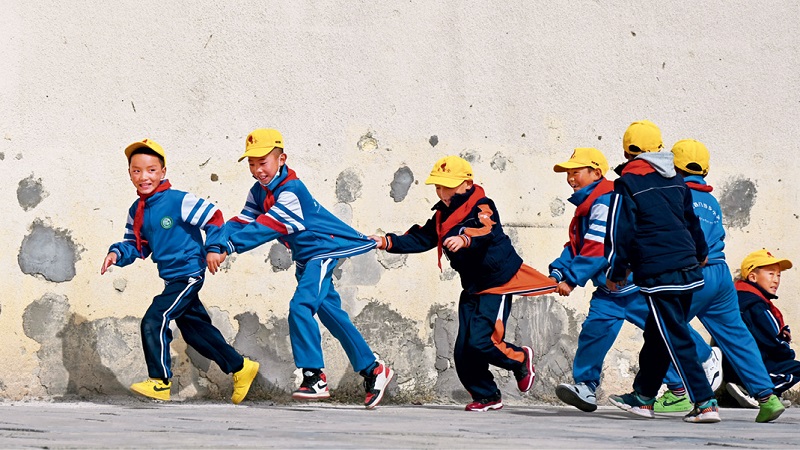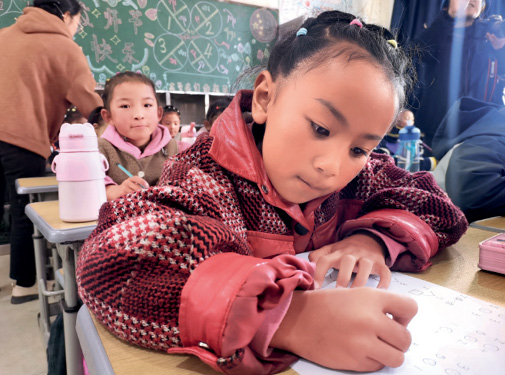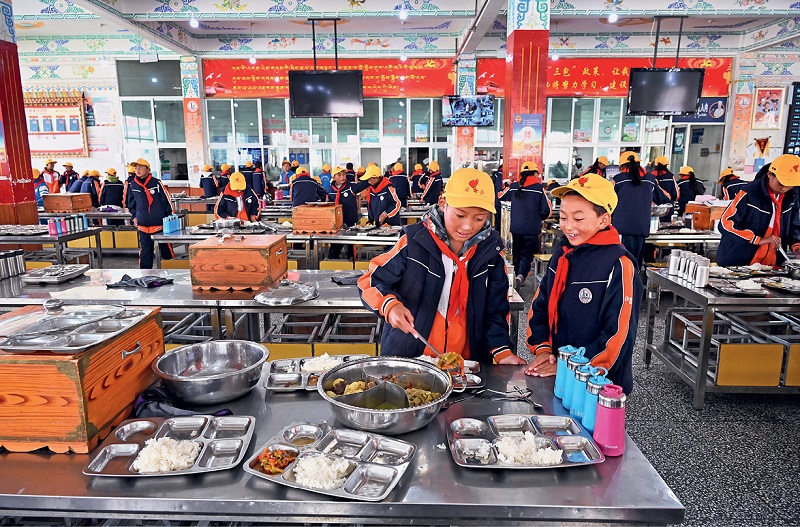China’s highest-altitude primary school is not only teaching children of farmers and herders but their parents as well.

Schoolkids play after class at the Sinopec Primary School in Nagqu, a city in Xizang Autonomous Region.
The Sinopec Primary School in Nagqu, a city in Xizang Autonomous Region in southwest China, is known as the school “the closest to the sky” due to its high-altitude location – a breathtaking 4,700 meters above sea level. Built by oil and gas giant Sinopec as part of its corporate social responsibility, the school opened in 2012 and has since become a microcosm of China’s drive for education, especially in remote and rural areas, to ensure that no one is left behind.
Nagqu is China’s highest-altitude city and the climate is harsh. The rarefied air lacks oxygen, making it difficult to breathe. The population is scanty and scattered, with no more than two people living per square kilometer on average. The people are herders and farmers by tradition, living a hardscrabble life. In the past, schools were not a priority, survival was. The nearest primary school was in the town, far away, and the road to the school was long and bumpy.
To adapt to the unique environment, it was decided that the Sinopec Primary School would also offer boarding facilities to the older children – fourth to six graders. This has enabled families living far away from the school to send their children here. Last year, the school was reported to have over 1,300 students when the original plan was to have about 850. To cope with the increasing number, in 2019, Sinopec put in an additional RMB 40 million to expand dormitories, classrooms, and the student canteen.

A first grader (front) does arithmetic problems in her classroom at the Sinopec Primary School.
Eyewitness to Change
Ngawang Wangdu, the principal of the school, has witnessed how local primary education developed step by step over the past 20 years. When he began working as a young teacher in the area after his graduation, there was a lack of awareness of the necessity for education. Parents and children alike didn’t take going to school seriously, and truancy and dropping out of school was common. It was not easy to retain them.
But things started changing as people began to realize the importance of education in changing destinies, especially of impoverished families. The authorities have been trying to drive that message home in various ways. For example, on the nearby busy national highway, a billboard enforces the message. “Education builds a safety net for you to brave the world,” it says. At the Sinopec Primary School, the buildings where the classrooms are display quotes written in both Tibetan and Chinese like, “Knowledge changes your destiny; education promises you a good future;” and “Today’s dropouts are tomorrow’s poor.”
The “three guarantees” policy – providing food, accommodations, and allowance for preschool to senior high school students from farming and herding households and impoverished urban families – has played a critical role in popularizing education. The state paid a subsidy of RMB 4,720 per year for each school-going child to cover food, dormitory, and tuition expenses. In addition, Wangdu said the Sinopec Primary School provides an additional meal of fruits, yogurt, and bread after dinner to ensure adequate nutrition. These measures have worked wonders, with the number of students almost doubling, and the dropout rate reaching zero.
In 2024, the subsidy was increased to RMB 5,620 per student. According to official data, 746,000 students in the region received the benefit.

Students have lunch in the cafeteria at the Sinopec Primary School.
A New Model
At the Sinopec Primary School, students have two different uniforms. Boarders wear the red one and day students blue. Of the over 1,300 students, nearly half are boarders, most of whom live far away. Their parents can visit them on Sundays and take them out. Parents and children like the arrangement now, but when the boarding system started, there were difficulties. Wangdu remembers how skeptical parents were about their children living on campus. “A father once arrived on his motorcycle from more than 200 kilometers away to pick up his child after class. But when he saw the nice lunch served in the school cafeteria and the daily supplies in the dormitory, his doubts dissipated. Subsequently, he sent his other two children as well.”
The boarding model has facilitated children’s access to education. It has also relieved farming and herding families, who do not have to drop their work every day twice to drive long distances to take their children to school and bring them back after class. This means they have more time for their work.
The Sinopec Primary School has brought the facilities of modern city schools to this remote region. It has central heating, a rarity in the area, the new classrooms have computers, the music room has musical instruments, and there is a basketball court as well as a football field. Students are taught both Putonghua (standard Chinese) and Tibetan so that they can communicate when they step out of the region while also inheriting their local culture.
Wangdu said developing Tibetan culture is an important mission of the school. Besides the Tibetan language, students are also taught Tibetan orthography, calligraphy and other cultural elements. The food caters to local traditions: At breakfast they have tsampa, a staple Tibetan food made of roasted barley flour, and milk tea. The main meals include other Tibetan dishes like the Tibetan specialty dumpling soup.
But perhaps the most important achievement of the school has been changing the mindset of the locals. Today the herder families are not satisfied with simply sending their children to school. They want their children to receive quality education, Wangdu said. So though there are more local schools and the environment of the schools has improved, those who can now want to send their kids to still better schools in the town.